William Doyle – Back to the suburbs in the artist’s own words
After retiring his East India Youth moniker, a songwriter finds sadness and wonder in our familiar cul de sacs
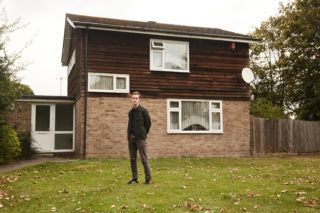
After retiring his East India Youth moniker, a songwriter finds sadness and wonder in our familiar cul de sacs
It’s been a while since anyone’s heard much from William Doyle. A previous Mercury Prize-nominated, enigmatic prodigy immersed in a world of ambient and electronic music, it’s been four years since he decommissioned his previous moniker of East India Youth due to touring fatigue and struggles with mental illness. Managing to kickstart a career through a chance meeting with the prolific music journalist and creative force behind The Quietus, John Doran – who eventually set up his own label solely to promote Doyle’s music – his ascent to cult stardom accelerated just as rapidly as it came to an abrupt, self-imposed end. Burdened by recurring bouts of depression and anxiety, Doyle’s been busy trying to make sense of his past through a meticulous introspection of his formative years living in habitats of English suburbia.
Born and raised in a 1930s semi-detached house in Bournemouth, the wake of his father’s death when Doyle was 12 years old catapulted he and his mother inland to the more secluded, labyrinthine setting of rural terraced life. Mourning and disoriented, this strange and unfamiliar landscape would eventually go on to fill the backdrop for his forthcoming album recorded under his own name, Your Wilderness Revisited; a record he tells me has been ten years in the making. As he retraces his steps down winding streets of picket fences, washing lines, tiled roofs and redbrick repetition, his tangible narration of sadness and wonder is vivid and real. Also, with a spoken word feature from Doyle’s friend, artistic ally and career-spanning muse Brian Eno, it’s a testimony worthy of suburban mythology.
Perhaps it’s fitting that the street where we meet, somewhere deep in the peripheries of South London, is lined with the familiar drab exteriors of a residential utopia. Unlike the warped, stony-faced portraits of previous album artwork, Doyle’s beaming, candid and softly-spoken demeanour feels disarmingly laidback.
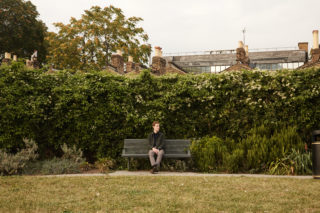
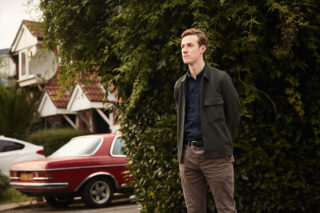
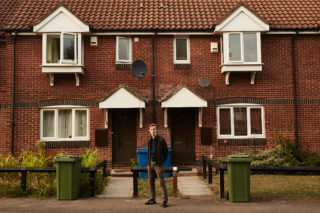
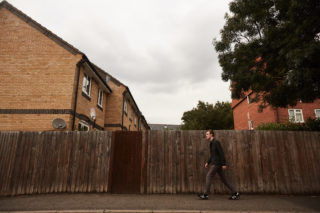
I once read this thing about Nick Cave’s dad dying and how it left a hole that he tried to fill through his work and not just through his various transgressions and addictions. He’d tried to write his father into existence – I can really relate to that.
It was a horrible circumstance, but I often think I’m very grateful for the journey that I’ve been able to go on. I feel like that seismic shock and the loss of his role in my life has all contributed to the strange life I’ve led so far.
The dark brown bricks, the way the roads were laid out; these cul-de-sacs spread out from the main road in many different arteries. When I started to wonder around, that’s when something opened up to me. I stopped looking at it as just ‘the suburbs’. My friend [Quietus co-founder] Luke Turner has just written a book called Out Of The Woods and one of its main thrusts is how nature isn’t a binary thing. Despite how people treat it, you don’t go to nature, it’s everywhere around us.
When I was younger, I mostly kept to the same routes that I used to go to school or the shops, and I never really deviated from them. Then one day, when I was out getting some fresh air, I just kept on walking. I remember thinking, I don’t know where this road goes but I’m just going to keep walking up here. Nothing really amazing happened along the way but when I got back to the house I felt really different.
I got back to my room and even though I was familiar with everything in there it felt like everything had been moved by about half an inch. Everything was the same, but different. It felt like some psychedelic experience.
I recognised him there – he was a very distinctive looking guy at the time: big beard and long hair. I handed him a CD and told him that I was a big fan of his site and how it’d been a big influence on the music I’d made through the various stuff I’d found there. The only reason I was at a Factory Floor gig anyway was because of The Quietus.
He got back in touch about a month later. My demo had been sitting in a pile of CDs that he’d eventually got around to listening to. I guess he really liked it and the rest is history.
It’s like I bypassed that thing where you’re the ‘artist’ and they’re the ‘publication’. That dynamic hasn’t ever been there. They’re just people I love and cherish.
Working with software and using synthesisers was a new lease of life. I no longer had to carry on with that linear way of writing vocals and guitar melodies. It was about creating soundscapes and instrumental pieces. It was a completely different music to what I was doing before. It was liberating that I could step out of one thing and go into something completely different.
Where there’s not many peaks and troughs. It’s a cultural phenomenon where it’s like being in a shop all the time – people want it to be a consistent experience and I don’t want that. I like friction and trying to make things butt up against each other. I like the jagged edges of when harmony goes up against more atonal bits.
When I create, it’s escapism. I was doing it because it felt good. I wanted to make music to pursue that feeling and I didn’t care what happened to it. I think once you unburden yourself from whether it’s going to be successful or not, it just flows out of you easier and people tend to respond to it in a more visceral way.
I needed another stark change, which I think is a reoccurring theme in my life. I finished East India Youth and just like that it was over. For better – but probably more for worse – that’s just how I deal with things.
There wasn’t really much of a gap in between those two [East India Youth] albums and halfway through touring Culture Of Volume I was really burnt out. I couldn’t really do anything. I wasn’t making music; I didn’t have any interests or anything on the go.
I started to record music under my own name so I could make something that wasn’t under the same scrutiny. I had to find my way back into making things but I didn’t want to do it in a way that was under the spotlight of that thing that carried so much baggage.
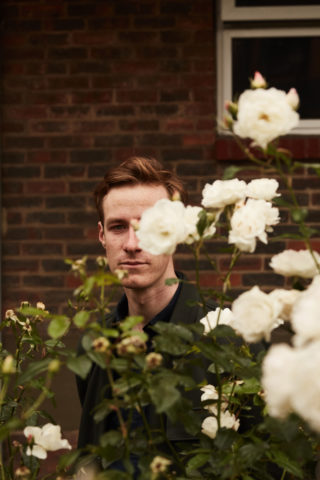

You’re noticing everything but you feel removed from it. On the first track of the new album, I talk about seeing things on a tilt. I once saw an interview with Leonard Cohen where he described clinical depression. He said the room is on a tilt and you’re thrown off balance. Everything was floating and not in a good way.
I remember sitting in Kings Cross and having this episode that ended up lasting weeks. I was looking around and thinking this doesn’t feel real. My vision had become doubled and I was disorientated. I felt like I wasn’t really there.
There’s this misconception that artists draw from the negative things and I really didn’t want this record to be that. I had to find the joy in what I was talking about.
I don’t really want to make things in that space anymore now. People start to associate you with it and think your work is defined by those means. I’ve definitely seen it being used disingenuously by artists as a way of selling a record and it’s fucking bollocks.
You don’t have to go to his studio and there be a project in mind; you just go to his studio and get involved with anything he’s working on that day. It’s just a constant production factory.
He really throws you into it. He’ll have an instrument thing already set up and he’ll demand you play sometimes without telling you what to play. He’s helped me become a better player. He doesn’t want you just to play a guitar line; he’s interested in sound and textures. It forces you to think in a very abstract way.
When you relate to someone’s work in a serious way, you’ve probably got something to talk about. The same reason why you put stuff out there is the same reason why he does it, and just because his work is very successful and famous, it’s ultimately driven by the same desire to communicate.
It can make you think about yourself and the world in a very life changing way. In the US, a lot has been made of the suburbs – look at Arcade Fire or David Lynch and Mike Mills films. There’s an American documentation of it, but the British version just hasn’t been related in the same way.
I think even though I’m drawing from very specific emotional experiences, the same epiphanies and profound moments that I found are also capable for others living in similar territories. The title of the record opens it out to them and suggests this isn’t just a one off.